re:View – The 2011 bookshelf II
It’s time for another round of book reviews. Same idea as before. In the second half of the year, I’ve moved on from reading mostly Moore and Pratchett to some American classics (and some that will certainly find their place among the new classics), some randoms, and – okay – some more Pratchett.
So, here’s the bookshelf from June to August. I’m determined to go through with this until the end of the year, so there will probably be another round or two later on. Some of the books I read recently have reminded me how much I used to love American literature. So expect some more of that. And feel free to make recommendations in the comments.
Mort
by Terry Pratchett | amazon (UK)
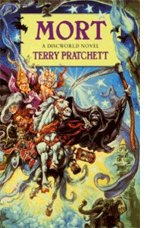 The idea of a mortal young man becoming Death’s apprentice / holiday cover and getting himself into all sorts of supernatural trouble certainly makes for an entertaining story. The style is very Pratchett, which is always a good thing. Sadly, aside from Death (who totally rocks on any appearance throughout Discworld), the characters just didn’t get to me. I didn’t massively care about their fate, which also means I wasn’t too bothered about the outcome of the story. Maybe it’s because of the main character, Mort, who’s just not very interesting. I had a similar problem with the male protagonist in The Truth – they’re both all right, but they’re just a bit flat. In contrast, all of Pratchett’s female characters I’ve come across so far have been multidimensional and complex, with contradicting good and dark sides, and very distinct quirks and attitudes. It seems to me as if Pratchett is putting a lot more attention into the creation of his female characters, embellishing their personalities with a massive amount of those feminine kind of details you don’t necessarily expect to ever even cross a man’s mind. Mort is still a good book though, just not one of those that I will remember for a long time.
The idea of a mortal young man becoming Death’s apprentice / holiday cover and getting himself into all sorts of supernatural trouble certainly makes for an entertaining story. The style is very Pratchett, which is always a good thing. Sadly, aside from Death (who totally rocks on any appearance throughout Discworld), the characters just didn’t get to me. I didn’t massively care about their fate, which also means I wasn’t too bothered about the outcome of the story. Maybe it’s because of the main character, Mort, who’s just not very interesting. I had a similar problem with the male protagonist in The Truth – they’re both all right, but they’re just a bit flat. In contrast, all of Pratchett’s female characters I’ve come across so far have been multidimensional and complex, with contradicting good and dark sides, and very distinct quirks and attitudes. It seems to me as if Pratchett is putting a lot more attention into the creation of his female characters, embellishing their personalities with a massive amount of those feminine kind of details you don’t necessarily expect to ever even cross a man’s mind. Mort is still a good book though, just not one of those that I will remember for a long time.
Read it? Depends on how big a Pratchett fan you are.
The Brief and Frightening Reign of Phil (Includes the
In Persuasion Nation Collection)
by George Saunders | amazon (UK)
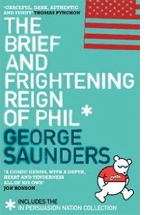 This is certainly not a book I would have chosen for myself, but The Boyfriend recommended it gently (by putting it right on top of my Stack of Books I Really Must Read). I found myself rather alienated by Saunders’ style at first. Which is probably why I didn’t massively enjoy the first story, The Brief and Frightening Reign of Phil, even though I thought it was really well observed and well written. But while reading through the rest of the stories in the collection, I got used to Saunders’ world and his characters, and once I became familiar with people with arms sticking out of their foreheads, talking corpses, self-castrating dog puppets and products from commercials flying around on a mad rampage, I more and more enjoyed the book. Although rather bizarrely cast, all the stories are very human at their core; they are deeply thoughtful and packed with some very uncomfortable truths. Saunders’ distorted American landscape is as disturbing as it is familiar. The In Persuasion Nation collection really got to me and made me want to read not only more Saunders, but also more contemporary American short stories.
This is certainly not a book I would have chosen for myself, but The Boyfriend recommended it gently (by putting it right on top of my Stack of Books I Really Must Read). I found myself rather alienated by Saunders’ style at first. Which is probably why I didn’t massively enjoy the first story, The Brief and Frightening Reign of Phil, even though I thought it was really well observed and well written. But while reading through the rest of the stories in the collection, I got used to Saunders’ world and his characters, and once I became familiar with people with arms sticking out of their foreheads, talking corpses, self-castrating dog puppets and products from commercials flying around on a mad rampage, I more and more enjoyed the book. Although rather bizarrely cast, all the stories are very human at their core; they are deeply thoughtful and packed with some very uncomfortable truths. Saunders’ distorted American landscape is as disturbing as it is familiar. The In Persuasion Nation collection really got to me and made me want to read not only more Saunders, but also more contemporary American short stories.
Read it? I very much recommend it.
Wintersmith
by Terry Pratchett | amazon (UK)
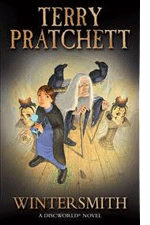 Number three in the Tiffany Aching series is a reunion with old friends – the teenage heroine, the witches, and of course the wee fairy folk. This time, Tiffany stumbles into the dance of the seasons (quite literally) and gets herself in trouble with Winter himself, in the process slowly morphing into the summer goddess. It’s an exciting story, darker than the previous ones and yet delightfully funny. What’s so good about these young adult fantasy stories is that they are essentially magic minus the marketing, swapping the Harry Potter-style spells and special effects for a more sober view of the subject of witchcraft and magic. In Tiffany Aching’s world, a witch isn’t a popstar. She may have fantastic skills and superior knowledge, but she spends her days caring for the old and the sick of her village, and the nights out in the snow searching for lost lambs. Her work is hard and dirty, and although people come to her when they’re in need – of anything, really – she will be the outsider, never fully trusted or appreciated. But her magic is the kind that makes sense: It doesn’t need Latin catchphrases or sparkly wands; it’s just human nature, the wisdom passed on through generations, and a bit of mysticism. And yet, Tiffany Aching would totally kick Harry Potter’s sorry ass any time. (But I bet even a Feegle alone could knock him out.)
Number three in the Tiffany Aching series is a reunion with old friends – the teenage heroine, the witches, and of course the wee fairy folk. This time, Tiffany stumbles into the dance of the seasons (quite literally) and gets herself in trouble with Winter himself, in the process slowly morphing into the summer goddess. It’s an exciting story, darker than the previous ones and yet delightfully funny. What’s so good about these young adult fantasy stories is that they are essentially magic minus the marketing, swapping the Harry Potter-style spells and special effects for a more sober view of the subject of witchcraft and magic. In Tiffany Aching’s world, a witch isn’t a popstar. She may have fantastic skills and superior knowledge, but she spends her days caring for the old and the sick of her village, and the nights out in the snow searching for lost lambs. Her work is hard and dirty, and although people come to her when they’re in need – of anything, really – she will be the outsider, never fully trusted or appreciated. But her magic is the kind that makes sense: It doesn’t need Latin catchphrases or sparkly wands; it’s just human nature, the wisdom passed on through generations, and a bit of mysticism. And yet, Tiffany Aching would totally kick Harry Potter’s sorry ass any time. (But I bet even a Feegle alone could knock him out.)
Read it? Yes. In fact, read the whole series!
The Help
by Kathryn Stockett | amazon (UK)
 In a fictional take on the history of racial segregation in the US, The Help offers a touching account of the lives of women in early 1960s Mississippi. Black maids are raising white people’s children, but aren’t allowed to use their bathrooms. In the midst of the racial tension in the town of Jackson, one free-thinking white woman crosses the boundaries and publishes a book of maids telling their life stories of working for white families, which causes as much outrage as it reveals unexpected truths. The subject here certainly isn’t new, and there have been other books telling of the injustice, cruelty and suffering in a segregated community with much more devastating examples. What I did like about this one, though, was the angle and the balance it strikes. Stockett doesn’t take a full-on “black people suffering under the tyranny of whites” approach. Instead she divides the book between three narrators – two maids and the woman writing their story – and shows the good and evil on both sides of town, among the white folks as well as in the black community. Of course this includes tales of oppression and pointless cruelty. But there are also stories of respect, compassion and love between employers and maids. The result is a multidimensional account of complex relationships that draws a compelling picture of life in the time, on both sides of the dividing line.
In a fictional take on the history of racial segregation in the US, The Help offers a touching account of the lives of women in early 1960s Mississippi. Black maids are raising white people’s children, but aren’t allowed to use their bathrooms. In the midst of the racial tension in the town of Jackson, one free-thinking white woman crosses the boundaries and publishes a book of maids telling their life stories of working for white families, which causes as much outrage as it reveals unexpected truths. The subject here certainly isn’t new, and there have been other books telling of the injustice, cruelty and suffering in a segregated community with much more devastating examples. What I did like about this one, though, was the angle and the balance it strikes. Stockett doesn’t take a full-on “black people suffering under the tyranny of whites” approach. Instead she divides the book between three narrators – two maids and the woman writing their story – and shows the good and evil on both sides of town, among the white folks as well as in the black community. Of course this includes tales of oppression and pointless cruelty. But there are also stories of respect, compassion and love between employers and maids. The result is a multidimensional account of complex relationships that draws a compelling picture of life in the time, on both sides of the dividing line.
Read it? It’s a good book, but very focused on the women’s angle – so I’d say mostly one for the girls.
The Catcher in the Rye
by J.D. Salinger | amazon (UK)
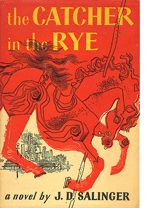 Oh well. It’s a classic, and it’s been on the reading list of every Anglo/American literature class I have taken since my final school year and all the way through university. So I figured that after dodging the book for so many years, and while it was conveniently available on The Boyfriend’s (now our combined) bookshelf, it was about time I read it. For the first third or so, I honestly only stuck with it because, given my background as a student of American literature, I would have been ashamed to admit to giving up on it. Meanwhile my annoyance with the character, the writing and the general fuss around this book grew. And then it somehow got to me. The mind of Holden Caulfield drew me in and I could hardly put the book down. I don’t know why; I couldn’t even say that I much enjoyed reading it. But there is something rather hypnotic about his anger. And weeks after finishing the book, I still have it going round my head quite a bit. I guess I get it now what the big fuss about this classic is all about.
Oh well. It’s a classic, and it’s been on the reading list of every Anglo/American literature class I have taken since my final school year and all the way through university. So I figured that after dodging the book for so many years, and while it was conveniently available on The Boyfriend’s (now our combined) bookshelf, it was about time I read it. For the first third or so, I honestly only stuck with it because, given my background as a student of American literature, I would have been ashamed to admit to giving up on it. Meanwhile my annoyance with the character, the writing and the general fuss around this book grew. And then it somehow got to me. The mind of Holden Caulfield drew me in and I could hardly put the book down. I don’t know why; I couldn’t even say that I much enjoyed reading it. But there is something rather hypnotic about his anger. And weeks after finishing the book, I still have it going round my head quite a bit. I guess I get it now what the big fuss about this classic is all about.
Read it? It’s a pain, but worth it.
Vernon God Little
by DBC Pierre | amazon (UK)
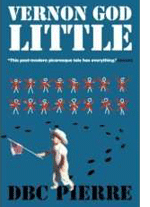 What a blockbuster of a book. The first one in a long time that had me on the edge of my seat until the last few pages, reading through dinners and people’s attempts to strike up a conversation with me. In an equally funny and scary story about the influence of the media, the only surviving witness of a school massacre in a Texas small town falls into the claws of a dodgy reporter on a mission to turn the events into a national reality TV franchise. With the real killer dead among the victims, the police, the outraged townsfolk and the headline-hunting media turn on survivor Vernon for a scapegoat. By the time the innocent teenager realises the trouble he is in, one ruthless reporter has already manipulated the entire town in constructing a case against him, sending Vern on a crazy escape to Mexico that leads straight to death row. It’s a big, bold story, but it’s the kind of story we read about in the papers at least once a year. The media closing in on a convenient target, the meddling with facts and the manipulation of everyone from your own mother to the jury and a nationwide TV audience – it all just sounds too familiar. And although the plot may seem a bit Hollywood-esque at times, this makes the story feel very real, and that freaked the sh*t out of me.
What a blockbuster of a book. The first one in a long time that had me on the edge of my seat until the last few pages, reading through dinners and people’s attempts to strike up a conversation with me. In an equally funny and scary story about the influence of the media, the only surviving witness of a school massacre in a Texas small town falls into the claws of a dodgy reporter on a mission to turn the events into a national reality TV franchise. With the real killer dead among the victims, the police, the outraged townsfolk and the headline-hunting media turn on survivor Vernon for a scapegoat. By the time the innocent teenager realises the trouble he is in, one ruthless reporter has already manipulated the entire town in constructing a case against him, sending Vern on a crazy escape to Mexico that leads straight to death row. It’s a big, bold story, but it’s the kind of story we read about in the papers at least once a year. The media closing in on a convenient target, the meddling with facts and the manipulation of everyone from your own mother to the jury and a nationwide TV audience – it all just sounds too familiar. And although the plot may seem a bit Hollywood-esque at times, this makes the story feel very real, and that freaked the sh*t out of me.
Read it? Oh yes. It’s awesome.
The Second Coming
by John Niven | amazon (UK)
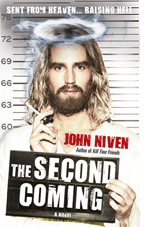 It’s a 21st century style New Testament. God returns from a long-ish holiday (Renaissance to present, to be precise) and isn’t exactly amused by the state of Earth and the attitude of his human creations, so he decides to send Junior back down to clean up the mess. In today’s America, of course, nobody gives a damn about a fanatic preaching the kingdom on a street corner, so Jesus – a naively good-matured hippie and divinely talented musician – needs to pull some desperate measures to get his message out there. The solution arrives in the shape of talent show American Pop Star, and soon the lamb is being set out for sacrifice again.
It’s a 21st century style New Testament. God returns from a long-ish holiday (Renaissance to present, to be precise) and isn’t exactly amused by the state of Earth and the attitude of his human creations, so he decides to send Junior back down to clean up the mess. In today’s America, of course, nobody gives a damn about a fanatic preaching the kingdom on a street corner, so Jesus – a naively good-matured hippie and divinely talented musician – needs to pull some desperate measures to get his message out there. The solution arrives in the shape of talent show American Pop Star, and soon the lamb is being set out for sacrifice again.
It certainly is an unusual take on the life of Christ – a swearing, pothead holy father and son take some getting used. The style Niven chose to tell his story is rude and at times tasteless; he exaggerates and provokes. But this is vital in getting the message across, and the book does so with a good deal of irony and comic relief. Many reviewers say, stay away from this book if you’re religious because it will massively offend you. But I doubt they’re on about the f-words and the joints. What Niven does, mostly, is hold up a big, bright mirror into the faces of all the right-wing Christians and the hypocrite religious fanatics who trek to church every Sunday but snub on the homeless people on their streets, or rally against homosexuals in the name of the Lord. If you get the message of this book, you know that the critics who cry loudest can only be the ones who recognise themselves in there. To all those who cry “outrage”, I can only say: If you’re honest in your beliefs, you’ve got nothing to be offended about here. Because more than anything, this book is a reminder of the very basic Christian message; the only thing that 21st-century Jesus really wants to get across to people before they nail him to the cross again: Just be fucking nice to each other.
Read it? It’s as sad as it is uplifting, it’s clever, it provokes, and it’s a fantastically funny read.
Pastoralia
by George Saunders | amazon (UK)
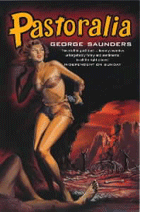 In this book of short stories, similar in style to the In Persuasion Nation collection, Saunders again holds up a mirror to our civilisation – one that you can’t help but face, no matter how disturbing the images may be. Although he casts a layer of fantasy on the real world, a kind of filter that makes everything feel distinctly out of order – whether it’s normal people living 24/7 as cavemen in a theme park attraction, or the corpse of everybody’s favourite aunt terrorising her family while slowly decomposing on the sofa – the human truths shine through with an urgent sense of reality. As with the first Saunders book I read, I was captivated by the narrative and the characters, even though they annoyed the hell out of me. I’m not sure why, but it might have to do with the fact that many of Saunders’ characters don’t think and speak in perfect literary prose. They are products of their backgrounds; some are smart and fortunate, some arrogant and self-centered, some uneducated but hard-working, some just a bit stupid. Their language, the spelling, grammar and syntax, is all over the place; it’s real. All these characteristics make them very much like people you meet every day. And despite the distorted, often nightmare-ish physical and emotional landscape that they are set in, this makes the whole thing disturbingly real.
In this book of short stories, similar in style to the In Persuasion Nation collection, Saunders again holds up a mirror to our civilisation – one that you can’t help but face, no matter how disturbing the images may be. Although he casts a layer of fantasy on the real world, a kind of filter that makes everything feel distinctly out of order – whether it’s normal people living 24/7 as cavemen in a theme park attraction, or the corpse of everybody’s favourite aunt terrorising her family while slowly decomposing on the sofa – the human truths shine through with an urgent sense of reality. As with the first Saunders book I read, I was captivated by the narrative and the characters, even though they annoyed the hell out of me. I’m not sure why, but it might have to do with the fact that many of Saunders’ characters don’t think and speak in perfect literary prose. They are products of their backgrounds; some are smart and fortunate, some arrogant and self-centered, some uneducated but hard-working, some just a bit stupid. Their language, the spelling, grammar and syntax, is all over the place; it’s real. All these characteristics make them very much like people you meet every day. And despite the distorted, often nightmare-ish physical and emotional landscape that they are set in, this makes the whole thing disturbingly real.
Read it? It’s brilliant. If you don’t mind a whole lot of uncomfortable truths being flung at you.
You’re an Animal, Viskovitz
by Alessandro Boffa | amazon (UK)
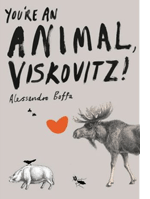 What a strange and clever little book. A series of short fables sees Viskovitz (a human spirit for all you can tell) reincarnating up and down the evolutionary chain. Under the loose plot of Visko’s tireless quest to conquer his ever elusive true love, each incarnation explores an essential human experience – the search for identity, life in a community, love and longing, the struggle of good vs evil, or simply the question of point of our existence. On the literal side the fables can get a bit too scientific at times – annoyingly so if you don’t happen to be familiar with the scientific terminology around, say, every cell in the body of a snail. But the metaphors are thoughtful and the writing is entertaining in its range from tragic to comic, so the book overall makes for a very rewarding read. If you ever wonder how we made it from the cell in the sea to the species we are today, and what the point of it all is – well, this book won’t give you all the answers, but it offers many original and entertaining thoughts about the part we play in the evolutionary game.
What a strange and clever little book. A series of short fables sees Viskovitz (a human spirit for all you can tell) reincarnating up and down the evolutionary chain. Under the loose plot of Visko’s tireless quest to conquer his ever elusive true love, each incarnation explores an essential human experience – the search for identity, life in a community, love and longing, the struggle of good vs evil, or simply the question of point of our existence. On the literal side the fables can get a bit too scientific at times – annoyingly so if you don’t happen to be familiar with the scientific terminology around, say, every cell in the body of a snail. But the metaphors are thoughtful and the writing is entertaining in its range from tragic to comic, so the book overall makes for a very rewarding read. If you ever wonder how we made it from the cell in the sea to the species we are today, and what the point of it all is – well, this book won’t give you all the answers, but it offers many original and entertaining thoughts about the part we play in the evolutionary game.
Read it? It’s a quick read, and it’s brilliant.
Her Fearful Symmetry
by Audrey Niffenegger | amazon (UK)
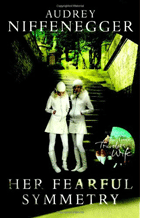 What a disappointment. When I was halfway through the book and still nothing had happened, really, I decided not to waste any more time on it. Aside from telling us every three pages, on average, just how symmetrical the twins in question are (because we probably didn’t get it the first ten times it was mentioned, or while reading the entire chapter dedicated to their symmetry early on in the book…) the story is mostly a history and tour guide of Highfield cemetery, with some popular literature-style waffle about love and loss sprinkled on top. The characters are flat and boring; once established they don’t develop at all. Even the bereaved character’s grief for his dead lover is shallow and completely void of emotion. And the ghost, frankly, is the most stereotypical accumulation of ghost story cliches that anyone can possibly think up. I don’t get all the fuss about the author. Sadly, like so many works by ‘bestselling’ authors these days, this book has no point, lacks substance, and is written in the most simple, un-challenging style and language – very obviously a product created to appeal to a mass audience.
What a disappointment. When I was halfway through the book and still nothing had happened, really, I decided not to waste any more time on it. Aside from telling us every three pages, on average, just how symmetrical the twins in question are (because we probably didn’t get it the first ten times it was mentioned, or while reading the entire chapter dedicated to their symmetry early on in the book…) the story is mostly a history and tour guide of Highfield cemetery, with some popular literature-style waffle about love and loss sprinkled on top. The characters are flat and boring; once established they don’t develop at all. Even the bereaved character’s grief for his dead lover is shallow and completely void of emotion. And the ghost, frankly, is the most stereotypical accumulation of ghost story cliches that anyone can possibly think up. I don’t get all the fuss about the author. Sadly, like so many works by ‘bestselling’ authors these days, this book has no point, lacks substance, and is written in the most simple, un-challenging style and language – very obviously a product created to appeal to a mass audience.
Read it? Seriously, don’t waste your time.
